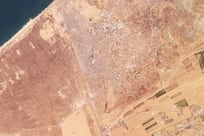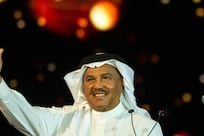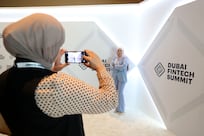Gaziantep, Turkey // In a room normally used as a play area for the children of guests at a plush Turkish hotel, the members of the Syrian opposition-run Idlib city council sit listening to a presentation on democracy and how it might work best in their war-ravaged country.
Standing in front of a white board, the moderator, an Iraqi who used to give classes on local governance in Basra after the United States-led invasion, asks the audience who is now in charge of the districts they administer.
One of the councillors quickly replies that the city council - the people sitting there, beneath the Winnie the Pooh and Mickey Mouse posters stuck to the nursery walls - now run things.
Another, younger, councillor disagrees, his answer winning enthusiastic support from the rest of his colleagues and the moderator.
"The people are now in charge, we are just their representatives," he says.
Similar democracy workshops, run by various small non-governmental organisations and groups of volunteer activists, take place several times a month, both in southern Turkey and in rebel-held areas of northern Syria.
While the county is trapped in an increasingly bloody conflict, away from the front lines - and sometimes right in the line of fire - local councils are being set up and run, filling the administrative vacuum left by the collapse of regime authority.
Across these opposition-administered zones, a contest is under way between proponents of a broadly liberal democracy and those who want the country run according to austere interpretation of Sharia. Between those two poles lies a spectrum of views, including different visions of a moderate Islam-based system.
The worsening conflict appears to be strengthening the hardliners, however, including Jabhat Al Nusra, the powerful Al Qaeda-affiliated militant group, which believes democracy to be against Islam. But growing violence has not halted the efforts of moderates, such as those on the Idlib city council, who want a democratic Syria.
"People want democracy, they are working for it; they just don't always know how best to go about it," says Yasir Al Syed, a member of the Idlib city council taking part in the workshop in Gaziantep. The programme is organised by the Syria Task Force (STF), an opposition NGO that works closely with the US state department.
"The culture of thinking and acting for ourselves was destroyed by four decades of dictatorship, so we are starting from zero," he says.
Despite the council's name, the city of Idlib remains in regime hands. Disparate opposition groups with different ideologies control much of the surrounding countryside, competing with one another for influence. It is a competition that the Idlib city council, local people elected by activists in the province, is not winning, opposition campaigners say.
Idlib's nominal councillors - they do live in the province but wield little control there - acknowledge that Jabhat Al Nusra and other hardline Islamist factions are popular. They have imposed law and order though Sharia courts, helped with food and fuel supplies, and proven themselves organised, capable fighters.
"We don't see much light at the end of the tunnel, that's the truth. The regime's terrible violence has brought violence from the opposition and under those circumstances, people support those with the ability to fight back," Mr Al Syed says.
But he, and others, suggest that the radical factions face a backlash from Syrians uneasy at the prospect of an intolerant version of Sharia.
"There is a big debate among people: Islamic law or 'international' type law. Sometimes it's a tricky question," says Rajaa Al Talli, a founder of the Centre for Civil Society and Democracy (CCSD). "Sometimes even having the word 'democracy' in our name has been a bit controversial."
A Syrian, she was studying for a doctorate in mathematics in Boston when the uprising started in March 2011. Seeing a wide unfamiliarity with democratic systems of governance among Syrians, she set up the CCSD to help teach the nuts and bolts of running small organisations democratically.
"There is a threat of Syrian society collapsing as everyone says, but what happens depends upon people and their actions. There are a lot of good people working hard for a good outcome. There is a real thirst for democracy, you can feel it," she says.
"We just need to understand democracy is a process, not a place you just arrive at. You learn by your mistakes, there will be differences of opinion and setbacks. The key is that people are organising themselves."
But a moderate vision needs organised backing and resources, opposition activists say.
Democracy campaigners with different NGOs agree they are being outspent by Islamist groups.
While the latter are generously funded by wealthy Gulf donors, the small democracy NGOs say they struggle to raise money to cover the cost of workshops, although western states, mainly the US, have paid for some events.
"At the moment, the people with the most money and the strongest fighting groups are the Islamist extremists. They can effectively buy influence," says Razan Al Sham, a young activist with the STF. The group helped arrange the cross-border trip by a US senator, John McCain, in May.
"If the moderates had those same resources, they would have more support. This is the real key," Ms Al Sham says. "If the democratic opposition cannot deliver security and services to the people and the Islamist extremists can, the extremists will keep getting stronger."
twitter: For breaking news from the Gulf, the Middle East and around the globe follow The National World. Follow us





